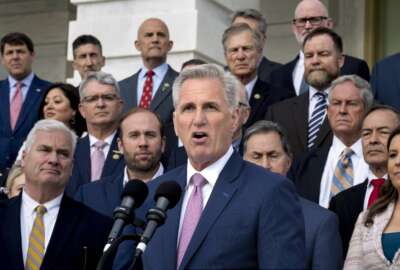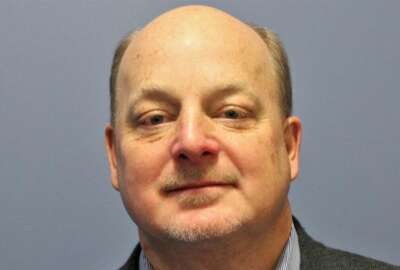
If the government defaults, you might need that cash in your mattress
More questions than answers surround the possibility of a government debt default. But it wouldn't be good for federal employees or retirees.
More questions than answers surround the possibility of a government debt default. But it wouldn’t be good for federal employees or retirees. For the duration, you might need to live on whatever rainy-day cash you’ve got saved up. For more, Federal Drive with Tom Temin spoke with certified financial planner Art Stein.
Interview Transcript:
Tom Temin And you’ve kind of posed a series of questions that we don’t know that make it hard to plan in the first place. What are some of the top questions that we don’t know? .
Art Stein Okay well, one, we have to realize and I did not realize that a default is different from a government shutdown.
Tom Temin Oh, yes, indeed.
Art Stein And we’ve actually, as I learned, never had a default. We’ve had shutdowns. And default is actually just all the payments, any money coming out of the government stops. So for federal employees and retirees, that means that salaries wouldn’t be paid. Annuities would not be paid. Social Security would presumably not be paid. Medicare, Medicaid. Everything could potentially stop. Now, one of the things we don’t know is are they actually going to stop all of that? And is the assumption that they would make up the payments afterwards good? But a default could happen in a lot of different ways. So to begin with, we don’t know when a default might occur. We keep hearing different dates. June 1st was the most recent date that I heard. That seemed to be pretty much I wouldn’t say set in stone, but seemed pretty definitive. But now I’m hearing that, well, maybe this, that and the other might happen. A key thing that we don’t know is if we had a default, would it last one or two days or one or two months? One or two days would be bad. I mean, it would raise interest rates maybe for a very prolonged period of time, and it would have various other reputational problems and things like that. An extended default would be disastrous. In my lifetime and probably yours, Tom, the worst two financial crises were the 2007, 8, 9 crash. And COVID. And it’s possible that a default would be worse than all of those. Because, one, it puts the United States in the position of such a self-inflicted wound that I think people many people would no longer depend upon us, they wouldn’t want to use the dollar and various other things. As I said, we don’t know if there was a default, whether the money that wasn’t paid would be paid once the default ended. And we don’t know how damaging it would be to the U.S. and world economies. So there are a lot of unknowns. But what we do know is this: A true default would mean that federal employees and retirees would not be getting any income from the government, including Social Security, not just salaries and annuities. So it means that everybody needs to look at their emergency funds because they might have to live on that for an extended period of time. And emergency funds, of course, include money you have in the bank, if someone has a home equity line of credit that could be used. Credit card debt, which I hate, but it would make sense to run up balances on your credit cards while this was going on, presuming that when it ended, the money would be paid back and you could pay off those loans or the interest cost would not go away. And maybe people need to have cash. I mean, I don’t know. Nobody knows, it’s just such an unknown.
Tom Temin We are speaking with certified financial planner Art Stein. To get back to the original point is it different? And it is different from a government shutdown. The irony here is that the Treasury would stop paying bondholders for T-bills that come due. But yet Congress has appropriated all of the dollars necessary for the fiscal 2023. We’re in the middle of. That was late getting it done. But those monies are appropriated so they could, in theory, be available. What’s lacking is any kind of guidance as to what the order of payouts would be. What is subordinated to what. And it could be that federal salaries would be at the top of the list, but we just don’t know yet. So that uncertainty from the White House, there’s no guidance from OMB or anybody else.
Art Stein I’m guessing that federal salaries would not be at the top of the list. I mean, I just think that top of the list is going to be – and what we’re speaking about here is instead of cutting off all the payments, maybe they would still make some payments and some kind of priority list of how to make payments. And there is a bill that I guess has passed the House that says, well, priority should be interest on the debt so we don’t default on our bonds and then they start going down the list. But I’ve also heard and here this is just speculation that people aren’t sure that they have the computer capacity to differentiate on these different types of payments. So it’s just this huge unknown. And and I don’t really, I can’t speculate on that or at least I don’t like to. All I can say is, it’s always important to have an emergency fund and to have some way of getting to spend money if you need money temporarily, like a home equity line of credit. And now might be the time when people that have that look good. I remember when we’ve had salaries were not paid. It was shocking how many people just could not go more than about a week.
Tom Temin Yes. And even though the Congress in the shutdown situations has voted to guarantee that the people would get back pay, that federal employees would get their back pay, nevertheless, that’s fine when it comes through, but you never know when it will come through. And as you say, people may only have a week’s worth of savings.
Art Stein And also we have, I’m sure there are government contractors who listen to your show and of course their payments would stop during a default. And I don’t know what the situation would be in terms of paying them back.
Tom Temin All right. And so what other advice do you have then? I mean, once you’re maxed out the credit cards and use up your cash, then what? I mean, that’s the end of the rope. Yeah. Or you start selling off TSP accounts.
Art Stein Yeah, well, that’s another potential source of income. But it would be really too bad if people had to do that because they’re going to be selling those funds probably after the both the stock and bond markets have crashed. And you really don’t like to sell during that type of situation. Of course, if you take money out before age 59 and a half you have penalties. I don’t know how quickly people could get that money out. The G Fund is affected in various ways that you may, I don’t think interest is going to be paid on G Fund balances and I’m not sure how available those balances would be to take out during a default. It’s just this huge catastrophe that we don’t know how it would unfold. And it it just seems amazing that we have to talk about something that is so totally stupid to let happen to your country. But politicians are acting in a way that it may happen.
Copyright © 2024 Federal News Network. All rights reserved. This website is not intended for users located within the European Economic Area.
Tom Temin is host of the Federal Drive and has been providing insight on federal technology and management issues for more than 30 years.
Follow @tteminWFED





